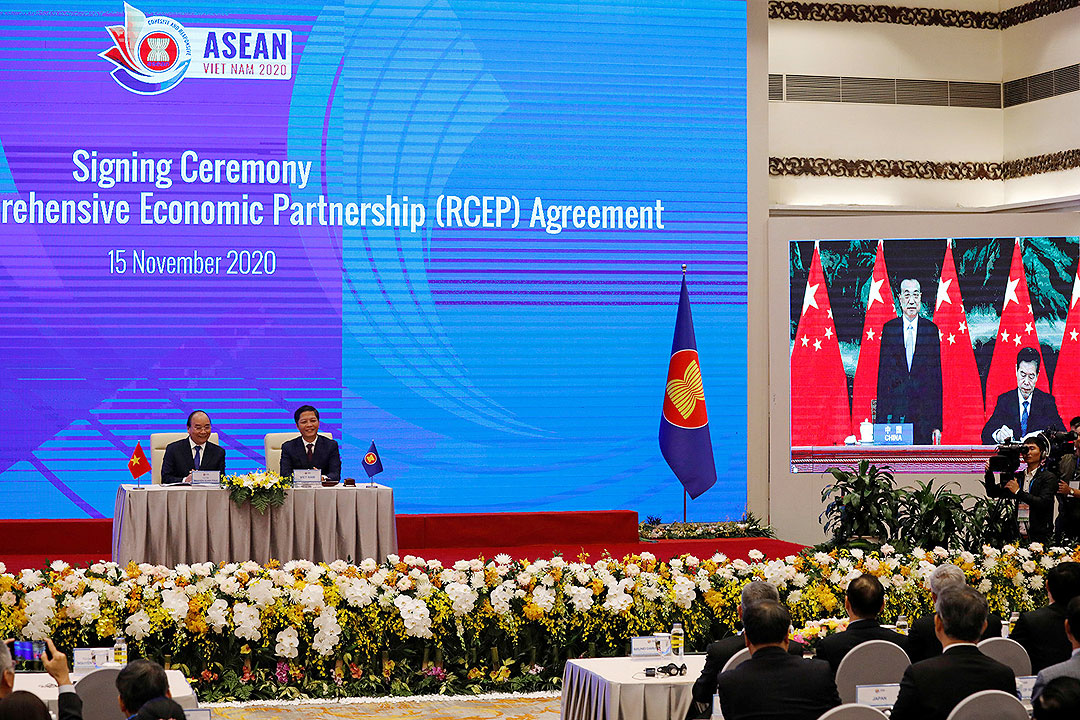American Chamber urges Senate to ratify RCEP trade deal treaty

THE American Chamber of Commerce of the Philippines (AmCham) said the Senate needs to immediately accede to the Regional Comprehensive Economic Partnership (RCEP) treaty after the trade deal came into force on Jan. 1.
In a statement on Thursday, AmCham Executive Director Ebb Hinchliffe said Senate concurrence to the RCEP deal needs to happen soon to allow Philippine businesses and American businesses based in the Philippines to maximize RCEP’s benefits.
“We already know that we are behind as the agreement was implemented on Jan. 1, 2022. We hope to see the country implement the agreement by early 2022,” Mr. Hinchliffe said.
According to Mr. Hinchliffe, the Philippines cannot afford to shun RCEP, as doing so would send a negative message to foreign investors and ASEAN partners.
RCEP is a free trade agreement among ASEAN, Australia, China, Japan, South Korea, and New Zealand.
“We see RCEP as a platform for our members to source cheaper local goods for production and manufacturing, as well as benefit the country’s vital sectors such as the creative sectors, financial services, research and development, information technology and business process management (IT-BPM), professional services, and energy, given the transparent, stable and predictable rules that the agreement provides,” Mr. Hinchliffe said.
Mr. Hinchliffe added that joining RCEP complements the programs and policies of the Philippines such as lower corporate income taxes under Republic Act No. 11534, or the Corporate Recovery and Tax Incentives for Enterprises (CREATE) Act.
“Such initiatives are very much what our members look for when investing in the country. The recent passage also of the amendment to the Retail Trade Liberalization Act is a good signal that the Philippines is working towards a more open, transparent and stable market in the region,” Mr. Hinchliffe said.
Separately, the Department of Trade and Industry (DTI) said the digital economy and business process outsourcing (BPO) sector are expected to receive a boost from RCEP.
Trade Assistant Secretary Allan B. Gepty said in a statement on Thursday that RCEP specifically addresses e-commerce, and will create a conducive environment for electronic transactions, promote cross border trade online, and raise cooperation and capacity-building in the Asia-Pacific.
The DTI said RCEP guarantees that covered businesses will not be required to transfer or relocate computing facilities as a pre-condition for establishing a presence in the region, and that the cross-border transfer of information via electronic means will remain unhampered.
“While this rule is not absolute as it is subject to certain exceptions such as essential security interests and legitimate public policy objectives, having this kind of stability will encourage more investments in the country particularly in the BPO sector whose transactions are mostly cross border and require an enabling environment to provide digital services,” Mr. Gepty said.
The DTI said RCEP also has transparent and effective consumer protection measures for e-commerce and other measures for the development of consumer confidence.
“The RCEP requires parties to adopt or maintain laws or regulations to ensure protection of consumers against fraudulent and misleading practices that cause harm or potential harm to such consumers. The chapter also requires parties to ensure protection of personal information of e-commerce users including through online consumer protection,” the DTI said.
The DTI added that RCEP takes a balanced and inclusive approach to protecting intellectual property rights.
“The commitments and obligations include harmonizing the protections and enforcement of intellectual property rights including provisions relating to technological protection measures and enforcement in the digital environment,” the DTI said. — Revin Mikhael D. Ochave



